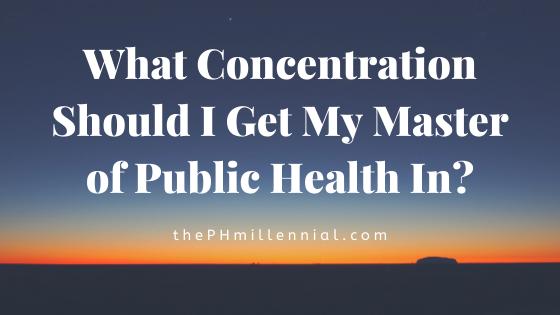You may be thinking, “what concentration should I get in my Master of Public Health?”
The answer is it depends! Public health is vast and thus you are able to learn a broad base of knowledge that can be applied to many sectors of the working world.
Concentrations can be good to guide your public health career path, but don’t let them be a hinderance.
My concentration is in Health Management and Policy but yet I felt equipped to handle topics outside this scope as my knowledge acquisition for my public health program was broad.
Support The Public Health Millennial on BuyMeACoffee
What Is a Concentration For Your Master of Public Health
A concentration in your Master of Public Health is a specific discipline of public health you choose to focus on during your graduate school studies. However, you will take all the same general foundation public health core classes.
Your concentration will shape the types of courses you take and what sorts of knowledge and skillsets you attain during you masters program. Some program also have additional “tracts” that you can take in a specific concentration which is a way of having more knowledge in that specific tract.
Typical concentrations are (Check out @Doughnuts_and_data post on IG):
- Epidemiology
- Biostatistics
- Environmental Health Science
- Biomedical Science/Genetics
- Health Promotion and Behavioral Science or Social Behavioral Sciences
- Health Policy and Management or Population Health Management
- Public Health Practice
Additionally, most if not all public health graduate programs allow you to take electives that will allow you to extend your knowledge outside of your specific concentration. Or you could take courses outisde of your program altogether.
When It Really Matters
The concentration you choose really matters if you want to get into a technical part of the public health field. For example, if you wanted to start a career in epidemiology or biostatistics. These career paths are more set in stone than others than you can encounter in public health.
And then, it could still depend as you can pick up the skills needed to be an epidemiologist/biostatistician outside of coursework. Remember could also take courses outside of your college that might compliment what you want to do. Think business, more GIS focused work, or anything that resides outside of the Public Health College – this can also set you apart. There might be additional cost if you do this.
Generally speaking, a student that has a concentration in ‘Health Policy & Management’ or ‘Health Promotion and Behavioral Science’ can apply for the and excel in the same roles after graduation. Most public health students are going to start off with similar skillsets. Many concentrations overlap in different ways and allow you to mostly cover the same core public health competencies.
Remember knowing how to transfer skillsets to new content areas is just as important having specific content knowledge.
Overall, you are able to shape the knowledge and skills you use through various internships, professional development experiences and other opportunities throughout your program. So unless you have a really specific goal after your Master of Public Health – and let’s be real, most of us don’t – then just choose a concentration that you think will help you get to the next step.
Considerations
Different Master of Public Health programs are going to have different concentration or may not even have any at all. When looking into programs, consider your broad career interest and use this to direct which concentration you choose.
Though you may choose a specific concentration, there are always ways to expand upon the knowledge and skills that you are learning in class. Some programs even allow you to switch concentration during the program, however I don’t think this is necessary if you are able to tailor other non-coursework experience to your future needs.
When I chose my concentration, the only thing I thought about was that I did biology for four and a half years and I wanted to think of things at a much larger level. Thus I have a concentration in Health Management and Policy.
Additional Thoughts
If you are unsure of what concentration to choose, here’s my simple advice. Consider if you want to work in a technical side of public health like in epidemiology or biostatistics like stated earlier, then you know where to fit in. If you interest lie outside of a specific technical concentration and you are unsure, then you have to do some research.
I would begin by truly reflecting and understanding what you want to get out of your Master of Public Health and where your designated target is. This will make it easier when you have to ask questions to find out what concentration would be a good fit for yourself.
Ask the programs outreach coordinator to chat. Ask for their programs alumni career outcomes report and see how those jobs outlooks look against your interest. Reach out to alumni. Speak to a mentor or a trusted person to discuss with them. Look at people LinkedIn’s profile.
If you have expertise in health education perhaps from completing a Bachelors in Health Education, then you may want to expand on that by taking a concentration that is not based on the things you just spend four years learning about. You have the base knowledge of health education, now you can compliment that with perhaps a Epidemiology concentration or Health Management and Policy. Build off of what you know and don’t replicate the work you already did.
Hey, some people will tell you to continue in the exact same vein as undergraduate. In my opinion, you should try to add additional knowledge by moving just outside that scope. You will also have the elective classes and other opportunities to deepen your work outside of your concentration – where you could focus on anything your heart desires.
Conclusion
Though choosing your concentration might seem like an end of the world decision. It will not define you. You can develop the important knowledge and skills in various ways throughout your Master of Public Health. Also with everyone taking similar foundational public health classes,. Ask about what electives you can do.
Lastly, get the experiences you need to set yourself apart regardless of your concentration.



